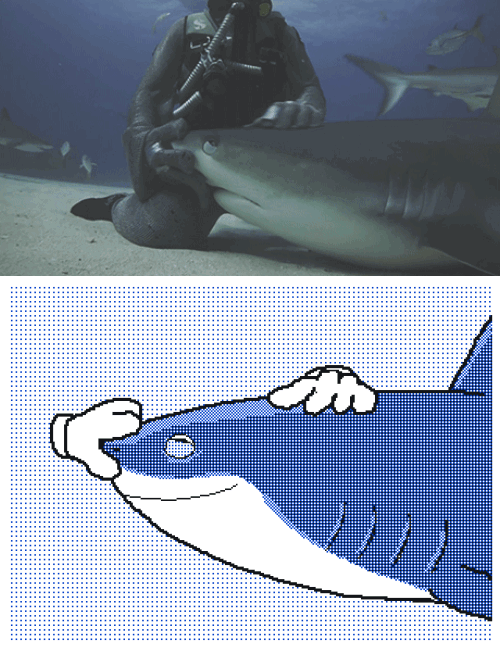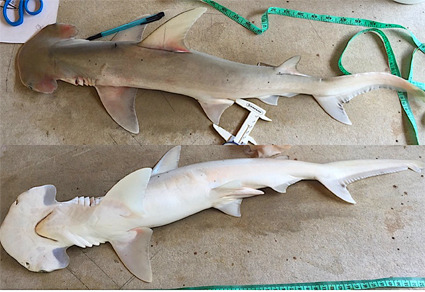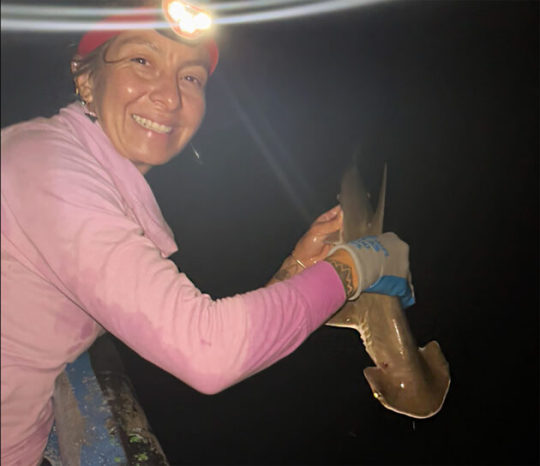#caribbean reef shark
Explore tagged Tumblr posts
Text
Todays shark is...
The Caribbean Reef Shark!

Fun Fact: The Carribbean Reef Shark is commonly found close to the bottom of shallow waters. As its name indicates, this shark is found in reefs, less than 30m deep!
#shark a day#shark#marine life#caribbean reef shark#im debating on after ive done sharks instead of just doing rays straight after like i planned on doing#since yknow. rays r sharks cousins i wanted 2 do that after i did sharks#what if instead#before rays#i did extinct sharks#if i can#how do we feel about that
99 notes
·
View notes
Text



Three sharks that I have illustrated:
The bull shark, Caribbean reef shark, and sand bar shark.
Yes, I love sharks too! Cetaceans are honestly a gateway into loving other marine animals, and for me, it just happened to be their fishy counterparts. As for which species is my favorite, well, there are two, and so far, I illustrated one of them, which is the bull shark.
75 notes
·
View notes
Text

I love this animal...the bark!
#paw prints#my art#artblr#mine#traditional art#traditional drawing#traditional illustration#acrylic markers#marker art#marine animal#marine life#marine life art#sharks#shark drawing#hammerhead shark#caribbean reef shark#leopard shark
19 notes
·
View notes
Text
🦈 Daily Shark Fact: 🦈
Caribbean Reef Sharks, when threatened, the Caribbean Reef Shark is known to do a “threat dance” that includes swimming in zig-zag motion while dipping the pectoral fins at intervals of 1-2 seconds, as if flexing them. When divers see this, they know it is best to get away as quickly as possible.


#caribbean reef shark#reef shark#shark blog#advocacy for sharks#respect the locals#save the sharks#shark awareness#sharks#shark facts#daily shark facts#cartilaginous fish#facts about sharks#just a girl who loves sharks#i love sharks#shark post#sharks of tumblr#shark tumblr#sharks are important#sharks are cool#sharks are friends not foes#fyp#the more you know#sharks dont infest oceans#protect sharks
145 notes
·
View notes
Text

Beautiful bby's
4 notes
·
View notes
Photo

"Jaws-Ome"
The Caribbean Reef Shark is an impressive and fast hunter. With the help of a long shutter speed, two underwater strobes and some speedy camera movement, the photographer created this breathtaking portrait of the dynamic apex predator. Sharks are a protected species in the Bahamian reefs, like in many other parts of the world's oceans, yet 80-100 million sharks get killed every year. A strong market demand for shark fins is the main driver. In order for shark conservation to be a success, Magnus believes that there needs to be an understanding that living sharks hold a greater value than dead ones. By Magnus Lundgren.
20 notes
·
View notes
Text

tumblr mobile is bugging so the post is a bit late but heres number 4 (caribbean reef shark)
8 notes
·
View notes
Text
Study will fill data gap on endangered local sharks
Tagging reef sharks for the new study (photo credit: James Dartnell) (CNS): The Department of Environment (DoE) has secured UK funding for pop-off satellite archival tags to study the movements of Caribbean reef sharks (Carcharhinus perezi) in the ocean around the Cayman Islands. Due to their ecological and socio-economic significance to Cayman, all sharks are protected species and are now…
#Caribbean reef shark#Darwin Plus Local#Department of Environment#Dr Johanna Kohler#Featured#John Bothwell#Tim Austin
0 notes
Text

this took too long to make so i'm posting it separately too
#sharks#silky shark#great white shark#mako shark#oceanic whitetip shark#blacktip reef shark#angular roughshark#caribbean roughshark
282 notes
·
View notes
Text
the shark we saw today is known as sparky because he tried to eat a boat once and got a spark plug stuck in his mouth.
13 notes
·
View notes
Text
Caribbean Reef Shark

Shark friend
🦈❤️
#caribbean reef shark#possibly a blacktip but that’s just based on the tail end of the shark in the background#reef sharks chill as hell
68K notes
·
View notes
Text
btw my Agent 4 and Neo 3 are sharklings :3
#Mako [Neo 3]#Reef [4]#Fun Fact !! Their both named after sharks :3#Neo 3 -> Mako Shark#Agent 4 -> Caribbean Reef Shark#Author_Cat.txt
1 note
·
View note
Text
🦑 Daily Cephalopod Fact: 🦑
Caribbean Reef Squid: A phenomenon, deemed the "half-and-half" body pattern, is a body morph that occurs during interactions with other cephalopods. One half of the cephalopod's body gets darker than the typical coloration a few minutes after the interaction occurs. This color-change is also observed during the sleeping state. The extended 'quiet state' results in a pale, uniform color compared to the shorter 'active state' including varying colors, textures, and patterns.


#caribbean reef squid#reef squid#squid#mollusk#cephalopod#daily cephalopod#daily cephalopod fact#cephalopod facts#facts about cephalopods#shark blog#respect the locals#ocean animal#ocean life#ocean#marine biology#marine life#marine animals#marine
59 notes
·
View notes
Text
I Love Sharks 🩵 🦈

Guys did you know l loved sharks
here, look at my shark
1 note
·
View note
Text


NEW HAMMERHEAD SHARK JUST DROPPED
Not every day does a new shark get discovered! Meet the Shovelbill Shark (Sphyrna alleni), a newly described species of hammerhead shark named after Microsoft co-founder and philanthropist Paul Allen. This new species is found in the coastal waters of the Caribbean and southwest Atlantic.
Hammerhead sharks are easily recognized by their laterally expanded and dorsoventrally compressed heads. Genetic studies have revealed that what was once thought to be a single bonnethead species (Sphyrna tiburo) is actually a complex, with Sphyrna alleni now recognized as a separate species. A longtime advocate for wildlife conservation, Paul Allen and his Paul G. Allen Family Foundation supported Global FinPrint, an international survey of the world’s reef sharks and rays. It was during this project that scientists conducted much of the fieldwork necessary to describe this newly recognized species. The Shovelbill Shark is smaller than the bonnethead, with distinct genetic and morphological characteristics, including a different number of vertebrae, which suggest it is separate from other hammerhead species. This new species is distributed from Belize to Southern Brazil, inhabiting estuaries, coral reefs, sandy and muddy bottom beds, seagrasses, and mangroves.

The Shovelbill Shark is a common component of artisanal fisheries in many Latin American countries and currently lacks proper management or protection. Previous reports indicate that this new species is undergoing overexploitation, making it imperative to safeguard their populations and establish fisheries regulations.
Photographs: Above is a male shovelhead shark (Sphyrna alleni), described from the Caribbean and the Southwest Atlantic. Below is Cindy Gonzalez, the lead researcher of the study, tagging the new species Sphyrna alleni (photo courtesy of the Mays Family Foundation).
Reference: Gonzales et al., 2024. Sphyrna alleni sp. nov., a new hammerhead shark (Carcharhiniformes, Sphyrnidae) from the Caribbean and the Southwest Atlantic. Zootaxa.
654 notes
·
View notes
Text

Meet the Caribbean reef octopus (Octopus briareus)! This reef-inhabiting cephalopod lives in warm shallow waters, spanning southern Florida to the Caribbean, through to South America’s northern coast. It’s distinguished by its eye-catching blue coloring, but this master of disguise can change its looks in an instant. Like other octopuses, it uses pigmented cells in its skin, called chromatophores, to alter its appearance. When confronted by a foe, such as a shark, it may emit a cloud of unpleasant-tasting ink to deter its enemy from further pursuit.
Photo: francoislibert, CC BY-NC-SA 4.0, iNaturalist
#science#natural history#nature#animals#ocean life#octopus#fish#sea creatures#coral reef#did you know#fact of the day#animal facts#marine biology#cool animals#camouflage
959 notes
·
View notes